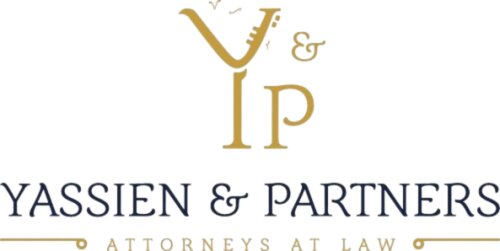Best Art & Cultural Property Law Lawyers in Agouza
Share your needs with us, get contacted by law firms.
Free. Takes 2 min.
List of the best lawyers in Agouza, Egypt
About Art & Cultural Property Law in Agouza, Egypt
This guide provides a practical overview of Art and Cultural Property Law as it affects individuals, collectors, galleries, museums and cultural organisations in Agouza - a district within the Giza governorate that is part of greater Cairo. Art and cultural property issues in Egypt are shaped by national laws that protect archaeological finds, regulate the trade and export of cultural objects, and govern restoration, loans and public display. Local enforcement and administrative procedures are carried out through national ministries and regional offices, so residents and businesses in Agouza must follow national rules while also complying with municipal and governorate requirements for events, commercial premises and cultural activities.
Why You May Need a Lawyer
Art and cultural property matters can involve criminal, civil and administrative legal issues. You should consult a lawyer when any of the following arise:
- Buying or selling artworks or antiquities where provenance or ownership is unclear.
- Facing a government seizure or investigation of objects in your possession.
- Applying for export permits, temporary export for exhibition, or import clearance.
- Disputes over ownership or inheritance of artworks and cultural objects.
- Drafting or negotiating loan agreements, donations, consignments or exhibition contracts.
- Licensing, copyright and moral-rights issues relating to artworks, exhibitions or publications.
- Restoration or conservation projects that require official approvals or oversight.
- Customs seizures, cross-border disputes or international restitution claims.
- Registering a gallery, museum or commercial venture dealing in cultural property and ensuring regulatory compliance.
Art law often requires proof of provenance, careful documentation and navigation of administrative procedures. A specialised lawyer helps protect your rights, avoid criminal liability, and resolve disputes efficiently.
Local Laws Overview
Key legal features affecting art and cultural property in Agouza reflect national Egyptian law and administrative practice. The following points summarise what you should know:
- Protection of Antiquities: Egyptian antiquities and archaeological finds are strongly protected by national legislation. Many ancient objects are considered part of the national heritage and may be subject to state ownership or special protection. Unauthorized excavation, sale, possession or export of antiquities can trigger criminal investigations and confiscation.
- Permits and Approvals: Export, temporary export for exhibition, archaeological excavation, major restoration and certain transfers normally require permits from the competent authority - currently the Ministry of Tourism and Antiquities or its authorised departments. Museums, galleries and conservators must follow registration and approval procedures.
- Criminal and Civil Remedies: Theft, illicit trafficking and illegal exportation of cultural property are criminal offences with penalties that can include fines and imprisonment. Owners and institutions can also bring civil claims to recover wrongly transferred or stolen objects.
- Dealer and Market Regulation: Commercial activity in cultural objects can be regulated. Dealers, galleries and auction houses are expected to perform due diligence, maintain documentation of provenance and be ready to demonstrate legal title on request.
- Restoration and Conservation: Major conservation or restoration works usually require technical approval and oversight by authorised conservators or the competent authority. Unauthorised alteration of protected objects can be penalised.
- International Conventions and Cooperation: Egyptian practice is influenced by international instruments that combat illicit trafficking and promote restitution and cooperation. Cross-border disputes or restitution claims often involve coordination between Egyptian authorities and foreign counterparts.
- Local Administrative Rules: For galleries, public events and cultural activities in Agouza you must also comply with municipal regulations, safety and zoning requirements, and any permits required by the Giza governorate or local municipality.
Frequently Asked Questions
How can I check whether an object in my possession is legally exportable from Egypt?
Start by gathering all available documents - invoices, ownership history, museum deaccession records, export or import permits and any conservation reports. Contact a lawyer experienced in cultural property and, if needed, the competent department at the Ministry of Tourism and Antiquities to ask whether the object requires an export permit. Do not attempt to move or export an object without confirmation, because unauthorised export can lead to seizure and criminal charges.
What should I do if the police or customs seize an artwork or antiquity I own?
Immediately speak to a lawyer and preserve all documentation and evidence of lawful ownership or provenance. Your lawyer can request official paperwork explaining the basis for the seizure, advise on how to challenge it, and represent you in criminal or administrative proceedings. Avoid destroying or hiding documents or attempting to recover the item yourself.
Can private individuals legally own antiquities in Egypt?
Egyptian law strongly protects archaeological heritage and in many cases antiquities found within the territory are considered state property. Private ownership may be limited for certain categories of cultural objects, and legal title often depends on provenance, the object's age and whether proper permissions were obtained. A lawyer can assess whether a particular item may be privately owned or subject to state claims.
Do I need a lawyer to open a gallery or host an exhibition in Agouza?
While not mandatory, consulting a lawyer is recommended. Legal advice helps ensure compliance with licensing, zoning, health and safety rules, and cultural property regulations. Lawyers can also draft or review sales contracts, loan agreements, consignment terms and artist contracts to reduce future disputes.
What happens if a work is claimed by the state as an antiquity after I bought it?
The competent authority may initiate procedures to investigate and, if justified, reclaim the object. Your legal position depends on factors such as the timing of the sale, due diligence performed by the seller or buyer, and the presence of any export or ownership documents. A lawyer can help negotiate restitution, show lawful acquisition, or pursue compensation if applicable.
How is provenance established for artworks and antiquities?
Provenance is documented through invoices, export or import permits, museum records, auction catalogues, expert reports and prior ownership documents. Scientific testing and conservation records can also assist. Lawyers often work with art historians and conservators to assemble provenance evidence to support ownership claims or transactions.
Are there specific rules for restoring or conserving artworks in Egypt?
Major restoration and conservation projects on cultural objects usually require notification and possibly approval from the competent authority. Work on protected antiquities should be supervised by authorised conservators. Failure to follow procedures can lead to penalties and may compromise legal protections or ownership claims.
What legal remedies exist if someone sells me a forged artwork?
If you purchased a forgery, you may have civil remedies for rescission, damages or restitution against the seller, and you may be able to file a criminal complaint if fraud is involved. Timely legal advice is important to preserve claims and collect evidence. Contracts should include warranties and representations to protect buyers in the future.
Can disputes over cultural objects be resolved through mediation or arbitration?
Yes, parties can agree to mediation or arbitration to resolve ownership or commercial disputes involving cultural objects. Alternative dispute resolution can be quicker and more confidential than court litigation, but matters involving public interest, criminal law or state reclamation may require court involvement.
How do I find a lawyer experienced in art and cultural property law in Agouza?
Look for lawyers with experience in art law, cultural heritage, administrative and criminal procedures connected to antiquities. Ask for references, examples of similar cases, and familiarity with the Ministry procedures and local courts. Local bar associations and cultural institutions can suggest practitioners. Arrange an initial consultation to discuss fees, strategy and expected timelines.
Additional Resources
Below are types of institutions and organisations that can assist or provide authoritative information. Contact details and procedures change over time, so confirm current office locations and hours before visiting.
- Ministry of Tourism and Antiquities - the national authority responsible for antiquities, permits, registration and enforcement.
- Local offices under the ministry and inspectorates that handle regional artefacts and conservation matters.
- National and regional museums and their curatorial departments for provenance information and technical advice.
- Customs and border authorities for questions about import-export controls and seizure procedures.
- Giza governorate and Agouza municipal offices for permits related to cultural events, zoning and commercial premises.
- Egyptian Bar Association and local bar associations for referrals to lawyers experienced in cultural property and art law.
- Universities and research centres with departments of archaeology, art history or cultural heritage for expert reports and provenance research.
- International bodies and conventions that inform practice, such as international cultural heritage organisations and professional conservation associations, which provide guidelines and ethical standards.
Next Steps
If you need legal assistance in Agouza for an art or cultural property matter, follow these practical steps:
- Gather documentation: invoices, bills of sale, export or import permits, photographs, restoration reports, correspondence and any preservation or shipping records.
- Preserve the object and any chain-of-custody evidence. Do not attempt to move or alter suspected antiquities without legal and technical guidance.
- Contact a specialised lawyer promptly. Request an initial consultation and be ready to provide copies of documents. Ask about experience with the Ministry of Tourism and Antiquities, criminal and civil procedures, and international claims if cross-border issues exist.
- Follow legal advice on interactions with authorities. If law enforcement or customs contact you, have your lawyer present or notified before providing detailed statements.
- Consider expert support. Provenance researchers, conservators and independent appraisers can strengthen your position and assist your lawyer.
- Keep clear records of all communications, agreements, and legal steps taken. This will help if the matter proceeds to negotiation, administrative review or litigation.
Disclaimer - This guide provides general information and is not a substitute for tailored legal advice. Laws and administrative procedures change. Consult a qualified lawyer in Agouza or the Giza governorate to get advice specific to your situation.
Lawzana helps you find the best lawyers and law firms in Agouza through a curated and pre-screened list of qualified legal professionals. Our platform offers rankings and detailed profiles of attorneys and law firms, allowing you to compare based on practice areas, including Art & Cultural Property Law, experience, and client feedback.
Each profile includes a description of the firm's areas of practice, client reviews, team members and partners, year of establishment, spoken languages, office locations, contact information, social media presence, and any published articles or resources. Most firms on our platform speak English and are experienced in both local and international legal matters.
Get a quote from top-rated law firms in Agouza, Egypt — quickly, securely, and without unnecessary hassle.
Disclaimer:
The information provided on this page is for general informational purposes only and does not constitute legal advice. While we strive to ensure the accuracy and relevance of the content, legal information may change over time, and interpretations of the law can vary. You should always consult with a qualified legal professional for advice specific to your situation.
We disclaim all liability for actions taken or not taken based on the content of this page. If you believe any information is incorrect or outdated, please contact us, and we will review and update it where appropriate.










